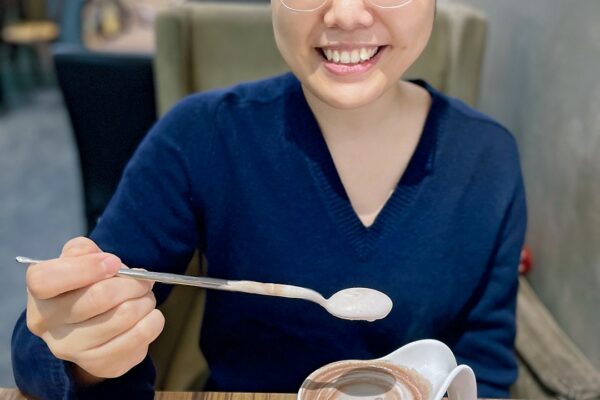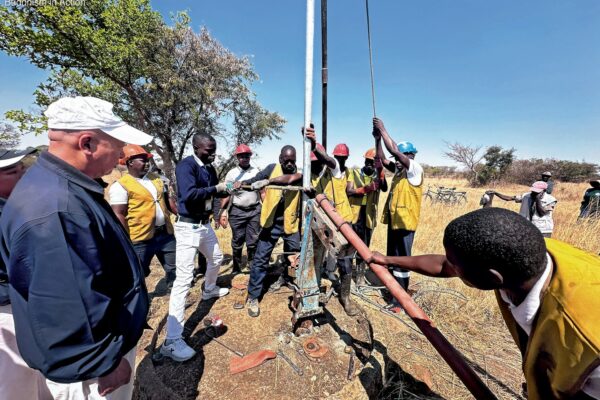By Yeh Tzu-hao
Translated by Wu Hsiao-ting
Photos by Yan Lin-zhao
The aging population on Taiwan’s outlying islands has resulted in a significant demand for assistive devices and long-term care. Volunteers brave challenges to deliver critical resources to those in need.
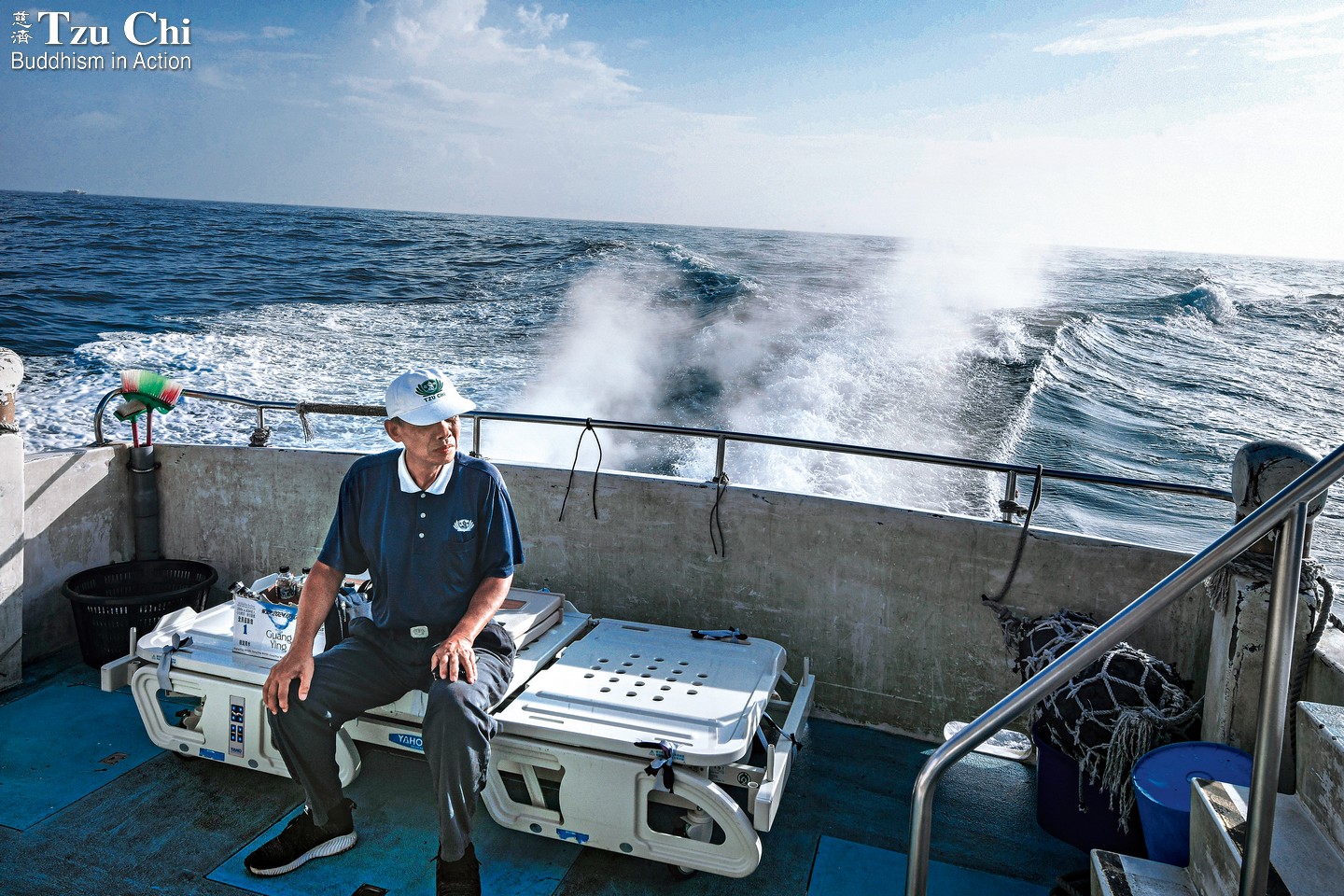
Volunteers from Tzu Chi’s assistive device team in Penghu take a boat to deliver equipment to a household on an outlying island. Even seasickness cannot deter them from carrying out these missions.
In the past ten years, tourism has given a boost to the economies of Taiwan’s outlying islands, such as Kinmen and Penghu. But despite this progress, such areas continue to face major challenges that must be addressed, including low birth rates, aging populations, and limited medical resources.
A visit to the towns and villages of these islands highlights an ongoing challenge: the exodus of young people from these areas. This leaves many elderly residents living alone or relying on each other. As a result, Tzu Chi’s assistive device teams on these islands face substantial demand for such equipment.
“The demand for assistive devices in Kinmen has exceeded expectations,” noted volunteer Hong Song-bo (洪松柏) from Little Kinmen. In May 2022, volunteers from northern Taiwan visited his home to introduce the Eco-Friendly Assistive Device Program to local Tzu Chi volunteers. The Kinmen assistive device outlet was subsequently launched on July 18, 2022. From then until October 2023, they provided assistive devices to over 300 households. That’s very nearly two households every three days.
The equipment Tzu Chi offers includes oxygen concentrators. Volunteers have noticed a high demand for such machines, perhaps due to the lingering effects of lung damage in individuals diagnosed with COVID-19. There has also been a substantial need for wheelchairs, commode chairs, hospital beds, and similar items. When the assistive device team in Kinmen receives requests for help, they retrieve the needed items from the local Tzu Chi office’s storage facilities. After cleaning and disinfecting, the objects are loaded onto a truck for delivery. If personnel, vehicles, and the requested items are all available, delivery can be made to the recipient’s home in about half a day. Even if there are delays of one sort or another, most deliveries are completed within three to five days.
Due to the high demand, the assistive device team in Kinmen stays quite busy. According to volunteer Wang Ren-qi (王仁戚), “Sometimes we make deliveries every two or three days, but sometimes we cover several places in a single day.” The team members are usually older and moving the equipment often leads to aches and pains, but they persist in their efforts. Wang himself is 76. “I have to do it!” he exclaimed. “Our services bring relief to people, so I find joy in it!”
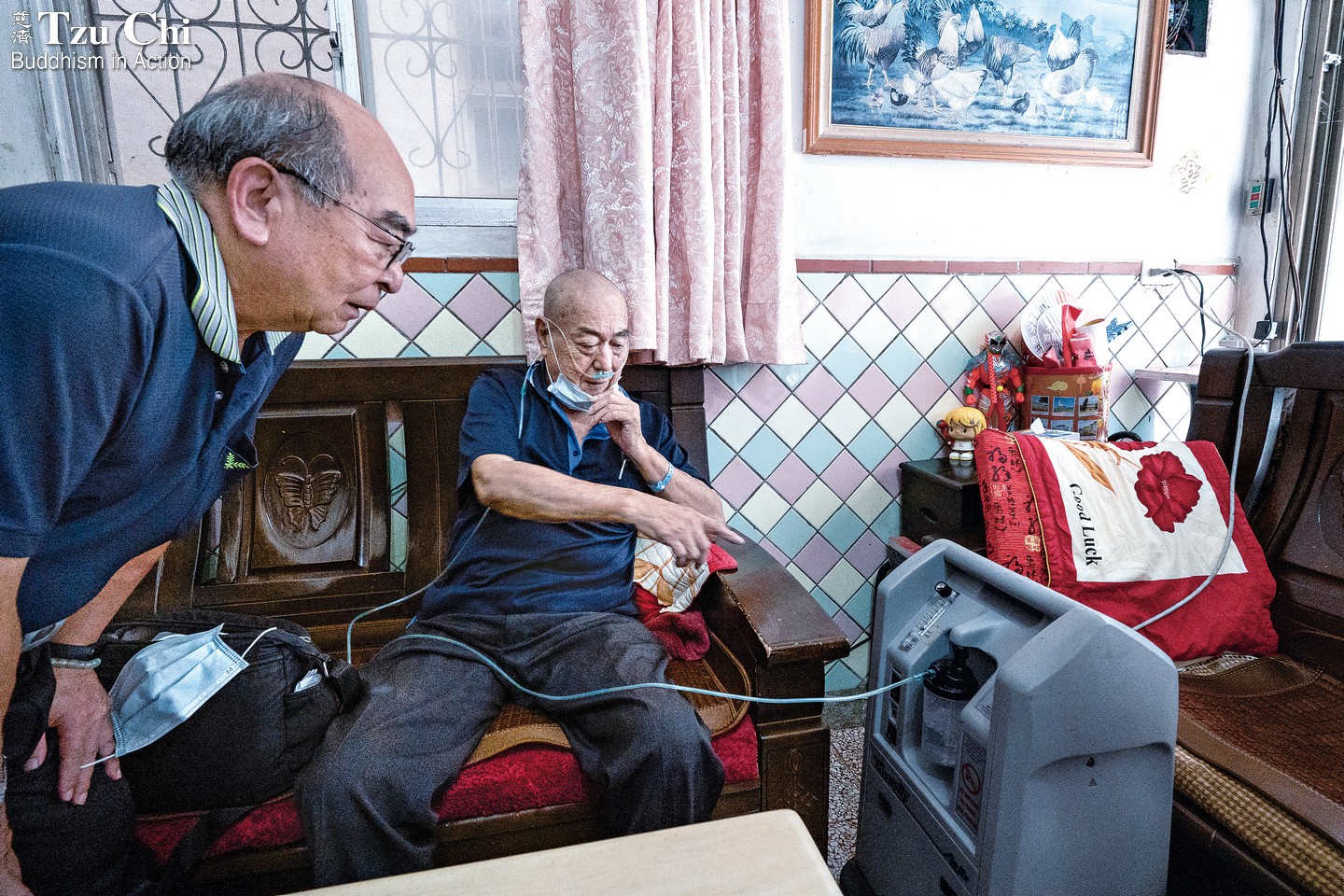
Volunteer Chen Xiang-jing (left) delivered an oxygen concentrator to Wang Qing-wu (right) and taught him how to use it. Hsiao Yiu-hwa
Deliveries and community care
Kinmen boasts many traditional Southern Fujianese buildings and old Western-style houses. The county government encourages residents to restore these historical structures when possible. Thus, volunteers often find themselves having to navigate through winding alleys flanked by such buildings during their trips to deliver assistive devices. Sometimes they become lost in the maze of alleys, requiring extra time to locate the recipient’s home and complete the delivery.
When a household requires assistive devices, volunteers make every effort to deliver them promptly. Conversely, when a family informs them that they no longer need the devices, volunteers retrieve them as soon as possible. Take, for example, Mr. Li from the village of Kuningtou. He recently completed the funeral arrangements for his 90-year-old father. When he felt ready, he contacted Tzu Chi volunteers to collect the hospital bed provided by the foundation.
He had previously requested three electric beds from Tzu Chi—one for his father and the others for his mother and uncle, who were also dealing with physical decline. With all three seniors unable to care for themselves. Mr. Li, despite being under 50 at the time, made the decisive choice to quit his regular job and fully devote himself to the care and companionship of his family members.
“My children have grown, and I’m doing alright financially,” said Li, explaining his ability to leave a regular job at a relatively young age. “In addition to looking after the elders these days, I spend my time watching TV, doing odd jobs, and catching some sleep.” He nonchalantly talked about his caregiver’s life, which others might find challenging. He commended the comfort that Tzu Chi’s electric beds brought to his elderly family members. “The beds arrived pretty quick after I applied—within three or four days. Taking care of my parents and uncle became much easier once we started using the electric beds,” he affirmed.
Wang Qing-wu (王清武), another resident of Kinmen, received an oxygen concentrator from Tzu Chi. He also happens to be the former chairman of a disabled people’s association. Sharing his experience, he said, “I contracted COVID-19, followed by the flu. After a check-up in Taipei, I was waiting to return to Kinmen for dialysis when I passed out at the airport. I was rushed to the hospital, and stayed there for 36 days.” His ordeal didn’t stop there. Back home in Kinmen, he unexpectedly ended up in the emergency room and was hospitalized for another 16 days. He emphasized the fearful impact of COVID-19, explaining that since his lungs were still recovering, he needed an oxygen concentrator at home to serve his needs. His daughter applied to Tzu Chi for one, and volunteer Chen Xiang-jing (陳翔景) delivered it to his home.
At Wang’s home, Chen walked him through how to use the oxygen concentrator. “After switching on the machine, wait for a minute or two before inhaling to allow any remaining gas to clear. I’ve set it to 2.5, but if you ever feel like you’re not getting enough air, you can raise the oxygen level.” He also reminded Wang to keep away from open flames when the machine is providing oxygen and to use distilled water (not mineral water) in the humidifier to avoid inhaling impurities.
“Feeling comfortable with your breathing now?” Chen inquired. “Yes!” Wang replied. The volunteer mentally breathed a sigh of relief after confirming the machine was bringing relief. “How long can we keep this?” a family member asked. Chen took a moment to consider and then replied, “Once he’s back on his feet, you can return it to us.”
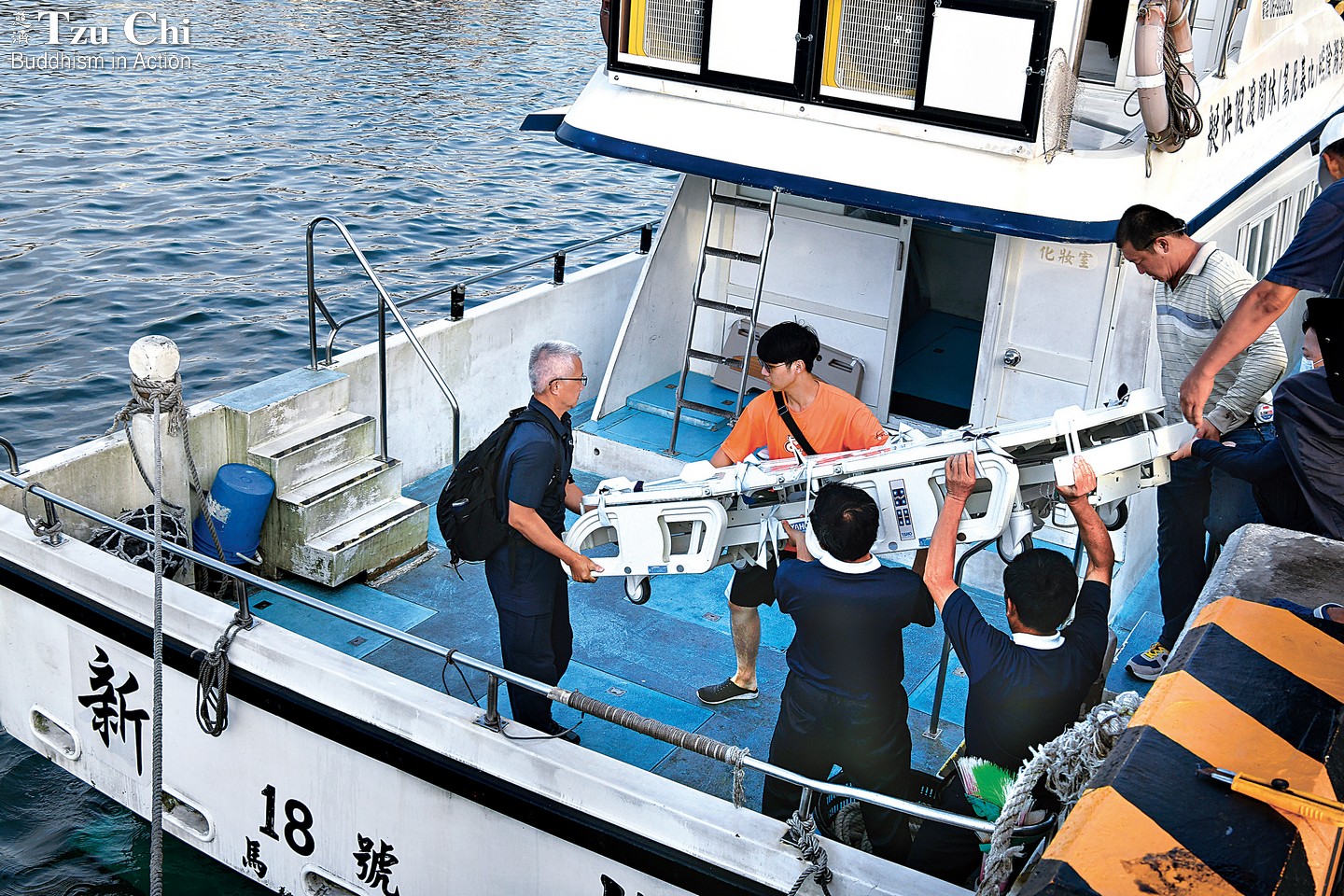
As the morning light gradually brightens, volunteers load an electric bed onto a boat, getting ready to deliver it to an outlying island in Penghu.
Overcoming seasickness
Penghu and Kinmen both deal with significant challenges because of their aging populations, resulting in a high demand for assistive devices and long-term care. The main difference is that Kinmen and Little Kinmen are connected by the Kinmen Bridge, making it easy to transport assistive devices by truck. In contrast, transportation between the main island of Penghu and its outlying islands, like Jibei, Wang’an, and Qimei, still depends on ferry services.
“In winter, the northeast winds in Penghu can be quite strong, reaching levels eight to ten, even 12,” said volunteer Chen Pei-lin (陳沛琳), a resident of Penghu. “Despite these challenging conditions, if someone urgently needs assistive devices, we make sure to deliver them promptly.” Chen can’t help but feel a bit nervous when she speaks of taking a boat, even though she’s lived more than 30 years on the main island of Penghu. She, like many Tzu Chi volunteers in Penghu, experience seasickness during boat journeys. Nonetheless, armed with vomit bags, they bravely face the waves to fulfill their delivery missions.
One day, Chen and fellow volunteers visited Hua Islet to deliver assistive equipment to Mrs. Liu, a 90-year-old living alone. Initially requesting only a cane during the village chief’s survey, volunteers soon discovered that Mrs. Liu needed more, prompting them to bring her a commode chair on this day.
“This won’t do; it’s too hard!” exclaimed Chen upon seeing Mrs. Liu’s makeshift bed, assembled from tables and chairs. The bed hadn’t been there during the previous visit. Mrs. Liu’s house was damaged by a recent typhoon, causing rain to seep through the roof to her bedroom on the first floor, soaking her original bed. Consequently, she had to move to the living room and create a makeshift bed using tables and chairs. Unable to ignore the situation, Chen promptly persuaded Mrs. Liu to accept an electric bed from Tzu Chi.
After convincing Mrs. Liu to accept the bed, volunteers encouraged her to try the commode chair they brought. “Come, have a seat and try it out,” said volunteer Xu Wen-hu (許文虎) as he unfolded the chair for Mrs. Liu to test. “With this commode chair, you won’t have to leave the house to relieve yourself at night.” Most old houses on Hua Islet don’t have bathrooms. Mrs. Liu had relied on public toilets and shower facilities since a young age, but given her advanced age, volunteers were concerned about potential risks of her going to public toilets in the middle of the night. Hence, the decision to provide a commode chair.
There are only two round-trip ferry services between Magong, on the main island of Penghu, and Hua Islet every day. Taking the afternoon boat on that day, the volunteers could only make a brief visit to Mrs. Liu during the less than half-hour docking period. They left to catch the return ferry after the short visit. After dinner that day, they decided to take the early morning boat the next day to deliver the electric bed to Mrs. Liu.
That night, volunteers carefully cleaned and disinfected the bed to be delivered. They blew away the dust on the bed frame with a low-pressure air gun and sprayed it with a diluted bleach solution to disinfect it. Early the next morning, after the sun rose, they loaded the bed and mattress onto a truck and transported them to the dock.
The outbound journey of about an hour was relatively calm. As soon as the volunteers arrived at Hua Islet with the bed, local residents and Coast Guard personnel assisted in unloading and delivering the bed to Mrs. Liu’s home.
Once at her home, volunteer Xu Wen-hu explained how to use the electric bed. “Come on, lie down here,” he said to Mrs. Liu. “When you want to get up, just press the raise button, so your back doesn’t have to work too hard.” He also recommended holding onto the bed frame and using her cane for support when getting on and off the bed.
Observing the volunteers helping Mrs. Liu, a neighbor remarked, “This bed is perfect for her; you’ve really helped the right person!” The woman then shared Mrs. Liu’s life challenges. After marriage, she gave birth to two sons, but the younger one had physical and mental disabilities. He now resides in a care facility. Both her husband and elder son have passed away. Her daughter-in-law lives in Magong, and her grandson works elsewhere, leaving Mrs. Liu alone on Hua Islet, relying on government subsidies. “Her back isn’t in good shape, and she often falls,” the neighbor said. “We always check on her if she sleeps in. One time we called her, but she didn’t answer. When we peeked through the window, we found her unconscious.”
The neighbor’s story reflected Mrs. Liu’s difficulties, but it also revealed the close-knit connection among neighbors. Now, with the addition of assistive devices to reduce the risk of daily activities, Mrs. Liu’s later years can be more secure.
“Life must go on, whether it’s tough or joyous,” said Mrs. Liu. Watching her lean on the cane provided by Tzu Chi, casually making visits to neighbors as usual, chatting with them, the volunteers could finally return to Magong feeling assured. “Take good care of yourself! Stay well!” the volunteers said, wishing the nonagenarian their best as they said goodbye.
Mrs. Liu tries out an electric bed provided by Tzu Chi as volunteer Hsu Wen-hu guides her on how to use it.
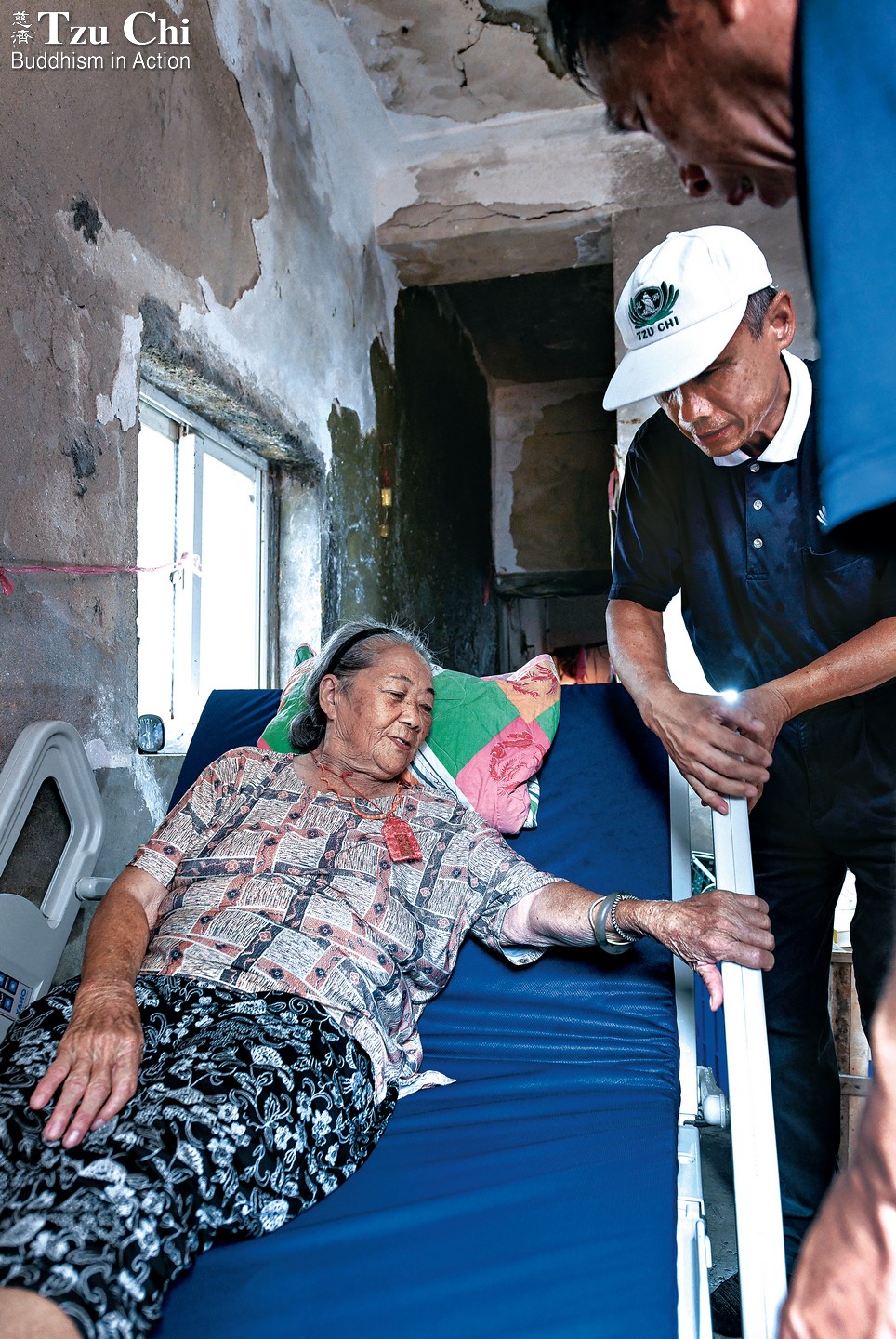
Putting forth their best efforts
The Tzu Chi Eco-Friendly Assistive Device Program has expanded its services to Taiwan’s outlying islands, including Penghu, Kinmen, Matsu, Little Liuqiu, and Orchid Island. The program’s service outlets in Kinmen and Penghu have been operating for over a year. Most assistive devices in these two areas are shipped from northern Taiwan, either departing from Keelung Port or Taipei Harbor to Kinmen, or being transferred from Chiayi, southwestern Taiwan, to Penghu.
Volunteer Chen Ming-zhou (陳明周), a resident of Chiayi, explained, “The quickest route when transporting assistive devices from Taiwan to Penghu is from Chiayi’s Budai Port. Volunteers from northern Taiwan guided us on related shipping matters, enabling our services to reach more people.” Chen shared that when the Chiayi assistive device outlet was established in 2022, they took on the responsibility of supporting Penghu. He and his fellow volunteers have since become well-versed in relevant shipping affairs. However, sometimes a hitch arises. “There are instances when we’ve already loaded everything for shipping, but due to adverse weather conditions, the boat cannot depart, and we have to wait.”
Compared to their counterparts in Taiwan, the assistive device teams on outlying islands face additional challenges, due to limited manpower and resources. Even transportation is impacted by weather conditions. Nonetheless, the volunteers persevere. One reason for their dedication is the positive feedback from local residents, who appreciate their ability to promptly address urgent needs.
Volunteer Chen Pei-lin mentioned that residents of Penghu applying for assistive devices through the county government often encounter long queues, resulting in waiting times of up to three months before receiving the equipment. Unfortunately, some severely ill patients under home hospice care cannot wait and pass away before obtaining the devices.
“In response to users’ needs, we swiftly dispatch the required equipment, enhancing their comfort in their final moments and aiding in a more peaceful departure,” Chen said. “I am grateful that they give us the opportunity to serve them.”
Speaking of the current operation of the Penghu outlet, she noted that most users or their families express deep gratitude, whether loaned devices are returned due to the user’s recovery or their passing. Some are even motivated to join as volunteers. “Even though the work can be tiring, it’s all worth it because of those moments that touch our hearts,” added Chen.

